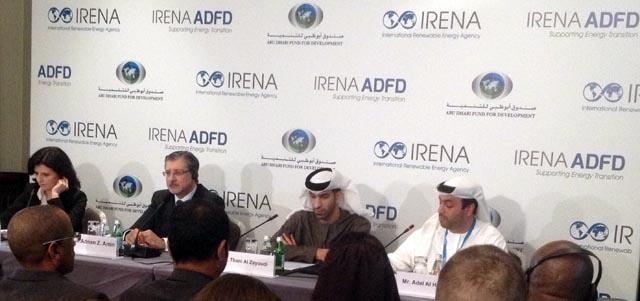You are here
UAE sees no impact on clean energy from falling oil prices
By AFP - Jan 19,2015 - Last updated at Jan 19,2015
ABU DHABI — The United Arab Emirates (UAE) on Monday downplayed fears that the fall in oil prices could negatively impact the development of renewable energy projects.
"Our interconnected energy landscape has evolved beyond the point where the price of oil determines the fate of clean energy," said Minister of State Sultan Al Jaber who is also chairman of Masdar, Abu Dhabi's renewable energy company.
Oil prices have fallen by almost 60 per cent since June, crashing on worries over global oversupply and weak demand in a faltering world economy.
Participants at the International Renewable Energy Agency (IRENA) conference in oil-rich Abu Dhabi on Saturday had voiced concerns that the trend could spell doom for plans to shift to clean energy.
Speaking at the World Future Energy Summit opening ceremony in Abu Dhabi, Jaber indicated that globally, investments in clean energy have increased by 16 per cent during the past 12 months amounting to $310 billion.
Meanwhile, production capacity of wind turbines and solar energy panels increased by 26 per cent during the same period, producing 100,000 megawatts.
Renewable energy has shifted "from an expensive alternative to a competitive technology", said Jaber.
"This growth has been driven by the sharp decline in cost and steady rise in technology efficiency," he added.
The Emirati official called for seizing the opportunity of falling oil prices to cut fuel subsidies that, according to him, cost the world $550 billion in 2013.
France's ecology and energy minister said Monday that the fall in oil prices poses a threat to global efforts to boost renewable energy use and lower carbon emissions.
"There is a real risk of the re-orientation of consumption towards fossil fuels, the ones that cause global warming and thus very severe climatic changes," Segolene Royal said on the sidelines of an energy conference in Abu Dhabi.
Royal told AFP the challenge to switch to cleaner forms of energy was "not insurmountable".
"We must take regulatory, fiscal and strategic decisions to ensure that this decrease [in oil prices]... can provide new flexibility to invest in renewable energy and energy savings," she said.
Royal said she was "reasonably optimistic" that renewable energy would continue to grow despite market pressure.
Renewable energy, which relies on solar, wind and other sources, is essential for meeting global CO2 emission targets.
The energy summit that opened on Monday is part of a series of events organised under the banner of Abu Dhabi Sustainability Week, including also an International Water Summit.
In March last year, Abu Dhabi opened the world's largest operating plant of concentrated solar power, which has the capacity to provide electricity to 20,000 homes.
On Sunday, An Abu Dhabi fund said that it will provide $57 million worth of concessional loans for clean energy projects in five developing countries.
The projects were aimed at bringing "reliable and sustainable power to more than 280,000 people" in Argentina, Cuba, Iran, Mauritania and St Vincent and the Grenadines, said the Abu Dhabi Fund for Development.
The second loan cycle is part of a commitment by Abu Dhabi to provide concessional loans worth $350 million (300 million euros) over seven years to finance renewable energy projects in developing countries.
The loans were announced jointly at a news conference with IRENA.
"Renewable energy offers the prospect of clean, affordable power to the 1.3 billion people currently off the electricity grid," said IRENA Director General Adnan Amin.
Ecuador, Mali, Mauritania, Samoa, and Sierra Leone are among the countries that have already benefited from such loans.
The Gulf region is one of the world's richest areas in sunshine but lagging far behind several other countries in harnessing the energy.
Related Articles
Falling oil prices could have a negative impact on global efforts to develop renewable energy sources, experts warned Saturday at a conference in Abu Dhabi.
AMMAN — Jordan's permanent representative to the International Renewable Energy Agency (IRENA) and Jordanian Ambassador to Abu Dhabi Jumaa A
The Abu Dhabi Fund for Development (ADFD) announced on Sunday it would extend concessional loans worth $41 million to six developing nations to implement renewable energy projects.

















